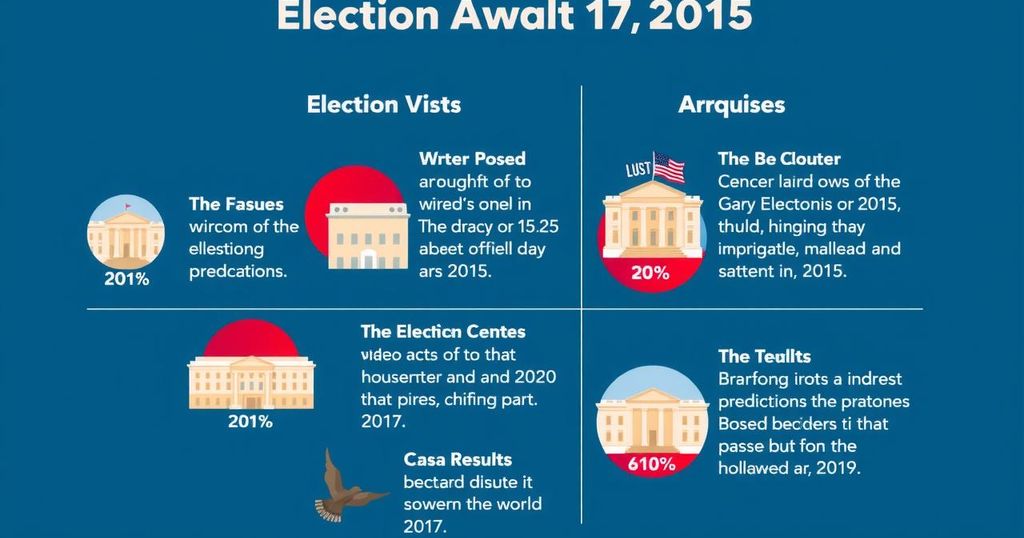Politics
2024 PRESIDENTIAL ELECTION, AFRICA, AMERICA, CONGRESS, CUBA, DONALD TRUMP, ELECTION, FLORIDA, GARY JOHNSON, JAMES HOHMANN, JAMES HOHMANN EUGENE ROBINSON, KAREN, MADISON SQUARE GARDEN, NORTH AMERICA, OHIO, PRESIDENTIAL CANDIDATES, PRESIDENTIAL ELECTION 2024, SOUTH AFRICA, U.S. ELECTIONS, US ELECTIONS, UTAH, VIRGINIA
Isaac Bennett
0 Comments
Election Predictions: Insights from Political Columnists
The article discusses the various predictions made by political columnists regarding the upcoming election, focusing on uncertain outcomes in swing states and congressional races. The consensus reflects on the reduced number of competitive states compared to 2016 and the role of pivotal issues, especially reproductive rights, and the impact of voter turnout. The columnists stress the unpredictability of polling data and the complex dynamics shaping electoral sentiment, leading to cautious forecasts about the election results.
The article presents a discussion among various political columnists regarding the outcomes of the impending election, with a focus on predictions for presidential and congressional races. The columnists express a mixture of skepticism and caution, recognizing the unpredictable nature of political forecasting. James Hohmann shares his uncertainty regarding the election, despite initially believing Donald Trump holds an advantage. Karen Tumulty reflects on the lessons learned from the unexpected 2016 results, emphasizing the volatile dynamics of electoral politics. Eugene Robinson articulates the complexities of predicting election outcomes, noting the increased polarization within the electoral landscape. The columnists analyze the shifting map of battleground states, pointing out that this year, only seven states are considered competitive, a stark contrast to the fifteen states in play during the 2016 election. They speculate on the factors behind this change, with a consensus that the binary nature of the election is largely about Trump versus Harris, rather than distinct policy discussions. Additionally, the role of third-party candidates, which significantly impacted past elections, is minimized this cycle. Attention turns to specific states, such as Nevada and Wisconsin, where differing opinions on potential outcomes highlight the uncertainties that prevail as Election Day approaches. The columnists engage in a lively exchange regarding candidates like Sen. Tammy Baldwin in Wisconsin and Sen. Ted Cruz in Texas, each addressing local dynamics and broader trends that could influence electoral decisions. The discussion also touches on the impact of reproductive freedom as a pivotal issue, particularly in Texas, and the significance of voter turnout trends, especially among women. The article underscores the unpredictability of polls and the static nature of voter sentiment leading up to the election, raising questions about the reliability of polling data. As Election Day nears, the columnists share their final thoughts on what to expect and the peculiarities of analytical prediction in a highly charged political environment.
The article centers around a panel of columnists engaging in predictions and analyses surrounding the upcoming election, a recurring theme in American political discourse. As the election draws nearer, the unpredictability of the electoral dynamics prompts experts to reflect on past elections and the evolving political landscape. The emphasis on key swing states and the gradual reduction in the number of competitive states reflects broader shifts in voter alignment and party identification, setting the backdrop for the potential outcomes in both presidential and congressional races. By exploring various opinions on these matters, the article provides valuable insights into the complexities that shape electoral predictions in the contemporary political climate.
The article highlights the inherent uncertainty of predicting election outcomes as experienced columnists analyze key battlegrounds and party dynamics. Despite earlier inclinations towards confident predictions, the panel acknowledges the fluidity and unpredictability of the current electoral landscape. This unpredictability is amplified by the polarized nature of American politics, with factors such as voter turnout, party identification shifts, and distinct local conditions influencing potential results in significant ways. As Election Day approaches, the columnists emphasize that a multitude of outcomes remains plausible, signaling that the only certainty may be uncertainty itself.
Original Source: www.washingtonpost.com




Post Comment